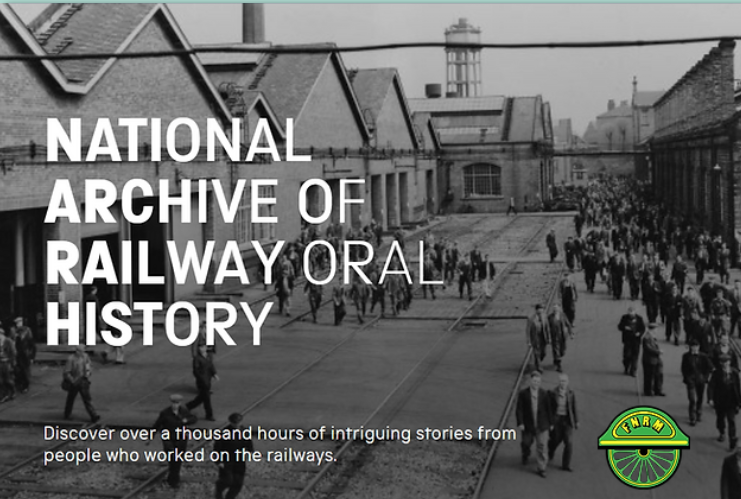Douglas Flett – Recollections
- Friends of the NRM
- Feb 15, 2022
- 4 min read
Updated: Mar 6, 2022
In his own words.
Extract from NAROH interview 2001/115. . . . . .
My earliest memories were of trains at the bottom of the garden, my father being the stationmaster at a little rural station between Aberdeen and Keith in the old Great North of Scotland line, at Kennethmont … our front garden overlooked the goods yard, there was a gate from the garden into the goods yard and I could see everyday the engines shunting, trains passing and it was just a part of life, quite natural, nothing odd about it, I couldn’t remember anything else … My father had joined the railway, the Great North of Scotland Railway in 1912, as a clerk at a little station called Ladysbridge on the branch line to Banff. He always used to say that his first salary was seven and six a week. I’m not sure what that is in decimal currency but he, and his digs were ten bob, and his family made up the difference. His forefather came from a little village called Findochty pronounced Fenechty locally, on the Moray coast. His family originally hailed I think from Orkney in the dim and distant past. They were all fishermen or seafarers except my Dad, for some reason I think probably influenced by the stationmaster at Findochty he joined the Great North of Scotland Railway, a regular job with a pension at the end was something … to consider I suppose at the time. He became stationmaster at Kennethmont in 1936 which was the year I was born.

The only industry if you could call it that there was Teachers Ardmore Distillery, and … in 1939 when I was three the war came along and after Dunkirk in 1940 the distillery was taken over by the Army, it was a RASC, Royal Army Service Corps, better known in these days as Ally Sloper’s Cavalry and they were a Command Supply Depot and they supplied rations for all the troops in the north of Scotland, there were an enormous number of men there, because all the people from Dunkirk, the 51st Highland Division was reconstituted there, all the rations, the food came in bulk into Kennethmont, into the distillery and then it was broken up into – all by rail of course, and it was broken up into smaller lots for all the units round the north of Scotland, so there was tremendous activity, a shunting engine there in a small rural goods yard, the laden used; sidings; I can recall an armoured train which which was very impressive to all the young lads of the neighbourhood, and we flocked to see this armoured train … there were various things went on, the very first film I can ever remember seeing was in the army --in what had been the malt barn at the distillery where the army set up a hall and a cinema, entertained the local populace with ENSA shows and the like. The army had a great influence, I’ve still got contact with at least one of the soldiers who was there at that time, a long long 60 years ago nearly … they … provided a lot of entertainment facilities for the local population, I can remember going to school there at Kennethmont school, and again one of my earliest recollections is seeing the local bobby peddling up the road past the school blowing furiously on his whistle. This was the air raid warning … It, it was tremendous railway activity there, and my father worked very hard, long hours and I think his health was beginning to be affected and in 1944 he was summoned to the LNER District Traffic Superintendent’s Office in Aberdeen, where the DTS, one James G Singer, another old Great North of Scotland man, offered him a job at Udny which is on the Buchan line, and he decided to take the job which was a promotion of course and found himself in charge of three different stations there, Udny, New machar and Logierieve. Astonishing as it may seem nowadays, these were extremely busy places and a lot of activity … and to get from one station to another and keep on top of everything they gave him a motor bike, it was an AGS, I can remember it well. He had never had a driving licence in his life but in these days during the war there were no driving tests, you simply filled out a form an application form as an essential user and by return of post back came his driving licence. He got aboard the motorbike without any tuition and shot off, and my brother and myself were in hysterics because he went down the road a bit, tried to turn the motor bike and it shot off at 90 – straight across the road, up the embankment and through a hedge, because he let the clutch in too quickly. He wasn't too amused at the entertainment that we found in this, and he, he was very busy with this, I can remember the railway then on the Buchan line was very busy, there was special trains going up and down, because I suppose that had been just about the time of – just after D-Day and there were a lot of military trains.. in 1
Douglas Flett joined British Rail in 1952 as a railman at Logierieve and retired in 1992 from the freight department at BR HQ. His recollections of 40 years working on British Rail were recorded in 2001 for the FNRM - NAROH project.
Find out more about NAROH here



コメント